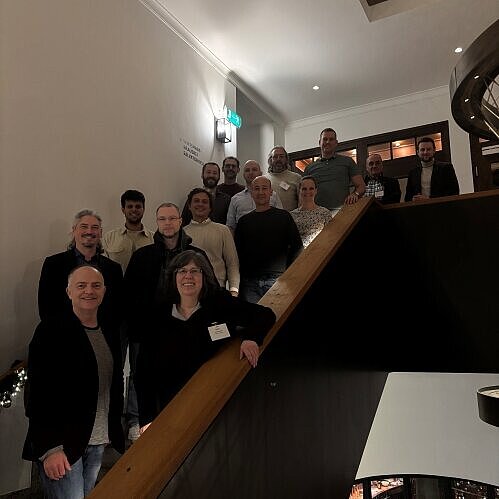30 years of Bayern Innovativ: How it all began - and where it's going
An interview with the founding father of Bayern Innovativ GmbH
02.07.2025
30 years ago, he launched Bayern Innovativ - with the aim of advancing the Bavarian economy. The foundation on which Bayern Innovativ GmbH still stands today is based on his vision. Without the then Bavarian Minister of Economic Affairs, Dr. Otto Wiesheu, the network of networks that today brings together business, science and politics would not exist in this form. To mark the anniversary, we take a look back with him at the beginnings: What drove him back then? What challenges had to be overcome - and how does he view the development of Bayern Innovativ today? At the same time, we look to the future: Dr. Rainer Seßner, Managing Director of Bayern Innovativ for ten years, provides insights into current developments and his vision for the future of the Bavarian innovation landscape. A conversation about courage, networks, technological leaps - and about what innovation in Bavaria will need in the future.

Dr. Wiesheu, Bayern Innovativ GmbH was founded 30 years ago. If you look back to 1995, what drove you to found Bayern Innovativ?
Dr. Wiesheu: The whole thing has a history: with reunification and the opening of the borders to the east, we suddenly found ourselves in a completely different situation. Until then, we had low-wage countries in the Far East, which was exploited by large companies. There were certainly considerable products coming onto our market from there, but at lower prices.
And we had a huge increase in job losses in this period after 1990-1993. At first it was said that the opening of the borders was a thirty-year economic stimulus program for us in Germany, because the economy in the eastern countries had to be built up. But it wasn't, because the question of who would pay for it was never answered. But the competitive situation was there, and mastering it, stabilizing jobs again and creating new jobs made it necessary to restructure many companies.
Then the trade unions and employers came along and wanted us to do something through the state. But we couldn't do anything with state subsidies, we could only use talks between employers and employees or banks to put them on a new footing. But that was not yet an innovation.
The question then was: How do we move forward? And we developed concepts that may have sounded illusionary at the time. Today it would be obvious: we needed new products, new farms and new markets. And the new products were not just biotechnology and genetic engineering, which were new to the market at the time, or information and communication technology with cell phones, which many people were skeptical about, especially when it came to the installation of transmission masts.
That was all necessary, but it was also necessary for the entire SME sector, which had no research facilities in the companies, to be introduced to new topics and new technologies or to be able to participate in them.
Before my time as Minister of Economic Affairs, I was State Secretary for Science and Art in the Ministry of Culture for three years. At that time, I had visited all the universities and universities of applied sciences in Bavaria, and I made contacts with the Fraunhofer Society and the Max Planck Society and other non-university research institutions. I had an idea of the potential that was there.
In the 1980s, there was initially a discussion about having the strictest possible separation between universities and industry. And I said that the first thing to do was to abolish it. We need an exchange of opinions, a flow between business and academia, and we need an organization that can do that. We need an institution with people who can talk to both academia and business and know what is going on in both areas.
This institution could not be a department in the Ministry of Economic Affairs, it had to be something where there was no state or administrative intervention. That was my motto. We had to be financed by the state, but organized outside the state and get the right people involved.
Was there initially a headwind for such an innovative project?
Dr. Wiesheu: There were a few people who thought I was crazy. It was an experiment with no guarantee of success. I was convinced that if we could find the right people who had the knowledge, the sensitivity and the ability to engage in dialog, that they would be respected on both sides, then something good could come together. That is the decisive factor, it depended on the right choice of personnel and on letting them work undisturbed. Those were the two key points.
It started small and then expanded because the demand grew. A good example of this were these automotive supplier congresses, which started out small and we had to invite people individually at the beginning. I remember the first major congress was at Audi in Ingolstadt, there were 40 or 50 companies there. And then it grew. After a few years, around 2000 or 2001, 1200 companies were represented there, which was almost unimaginable.
It was also interesting that not only companies from Bavaria came, they came from all over Germany, from France, they came from as far away as Canada. Because the automotive suppliers were active worldwide and were interested in it.
So it grew because Bayern Innovativ did an excellent job and was well received. That wasn't just the case here, it was the case in a whole range of technology fields. The important thing was, and I think still is today, the approach: let them work and don't interfere.
Was there that one moment when you realized that something big was being created that would change Bavaria?
Dr. Wiesheu: Yes, that was the feeling after two to three years, when we noticed that those who came to the congresses kept coming back and saying to colleagues: That's interesting, you have to go there. That wasn't the advertising that Bayern Innovativ did, with posters or newsletters or anything else. It was the word-of-mouth propaganda, the fact that more and more universities came and that a network developed where, after several years, I had the impression: "Oops. It lives on its own."
What basic ideas from back then are still just as important today, Dr. Seßner?
Dr. Seßner: First of all, it is still important that we drive the topic of innovation forward in a dialog between business and science, that we intensively push forward with the innovation players here. It's about supporting this dialog with the right people and growing the whole thing accordingly.
Dr. Wiesheu just said so well: "There's life in it and there's always something new being added." And in this respect, I can only say that this is exactly what has driven the success and further development of Bayern Innovativ GmbH over the last ten years. This interface between science, business and the right people has always brought up new topics.
This constant change is also what I believe has remained from the early days and what continues to this day. In this respect, the basic idea is still there. The good thing is that we are still allowed to shape and do things today, and we are actually very pleased that we enjoy this trust here and are allowed to develop further.
Today, we are active in all of the Free State's future fields. Back then, it was the ten fields of technology and the ten sectors. Today, in the innovation strategy of the Free State, it is the future fields of the Free State and Bayern Innovativ is active in all of these future fields with incredibly strong networks: from health to mobility, energy, materials, production, digitalization, security and defence, but also the cultural and creative industries. Now the second building block is being added with the corresponding services, i.e. with funding and start-up advice as a project sponsor, or with patent support.
We are having this discussion because Bayern Innovativ is turning 30 years old. Our oldest part will be one hundred and fifty years old - the Bavarian Patent Center. But we also have a strong innovation department that can help scout trends, scout technologies, create roadmaps and conduct scenario analyses. Last but not least, there is also the whole issue of Europe and international affairs, because innovations do not stop at Bavarian or federal borders, but are international, and we also work very closely and gladly with our sister companies Bayern International and Investment Bavaria, which are also based on Dr. Wiesheu's ideas.
When you look at the innovation landscape in Bavaria today, has your vision from back then been fulfilled, Dr. Wiesheu?
Dr. Wiesheu: When I look at it, I am more than satisfied, which was not to be expected at the time. We had said that we wanted to ensure that SMEs in Bavaria would become better and more competitive with product improvements and new products, that they would be able to withstand competition and that they would be able to keep up with the same wage costs and so on. It was a way of thinking for the Bavarian economy. It was an interesting experience that the whole thing very soon grew beyond the borders of Bavaria due to the economic circumstances and the great interdependence of the supply chains in various sectors.
At the time, we thought: Germany can be interesting. The fact that there is now a network that extends into other European countries and beyond Europe in various subject areas is great.
But I didn't expect the whole institution to develop in such a way that it would stand as a beacon in Germany and Europe, and to be honest, that wasn't the goal at the beginning. The aim was to help the Bavarian economy. The goal was also to utilize the potential of our universities and research institutions, in other words to promote the innovation process. And we have - thank God - overshot the mark. Now it is having a much wider impact and that can only be welcomed, because the development towards innovation, stability and competitiveness will be much better. One principle always applies and should be remembered: Nothing is more constant than change. This is true in science and in business, and Bayern Innovativ exemplifies this.
Dr. Seßner, has the spirit of innovation changed over time?
Dr. Seßner: When I follow this idea and listen to how it developed back then, a lot has remained the same. And the phrase "nothing is more constant than change" is something that we have even included in our strategy. We have set ourselves the strategy of constantly changing and adapting. Our team also knows that we regularly look at ourselves and ask whether we are still working in the right areas or whether we are still doing the right thing.
That's why we also make regular organizational adjustments. We have done this for the last nine to ten years and it has happened again and again in the 20 years before that. New tasks and new topics were added, which then addressed a need - and at the end of the day, that's what it's all about in business.
At the interface between science and business, it's about constantly addressing what companies need or what science needs and constantly offering new services in order to provide the right innovative impetus for companies. And this has also contributed to the great success of recent years and has made Bayern innovativ what it is today.
What developments will determine the future?
Dr. Seßner: There are an enormous number of topics that are driving the Bavarian economy. Digitalization has been driving us for many years, and within digitalization, of course, topics such as quantum technology. We are also active in the field of energy with renewable energies, but also new forms of energy such as fusion technologies, which of course also require this interdisciplinarity. Another topic is the linking of technologies, i.e. quantum technology with artificial intelligence or 6G, for example, which then enable applications that would otherwise be inconceivable.
Above all, however, it is important that we have different directions here. We support companies in entering the value chains of these new technologies, which means that they contribute to the implementation of this technology.
The second aspect, however, is that we then put these new technologies into practice for the companies and with the companies. In the case of quantum technology, for example, we support companies in making their contribution with components in this technology on the one hand and, on the other hand, in preparing companies at an early stage for what they can do with this technology.
What should be included in an innovation strategy for the next 30 years, Dr. Wiesheu?
Dr. Wiesheu: First of all, I wouldn't write it because I don't presume to be as familiar with the topics as I should be. But I think there are a number of points that stand out. What always remains is the topic of energy, which has become much more topical than it was 30 years ago. What also remains interesting are the topics of mobility and health, which are ongoing issues that humanity is dealing with.
What we are currently facing is the question of security and defense. Wars are no longer as simple as they were decades ago; they are all high-tech and we have to look at whether we are up to date.
It's the same with technologies in cyberspace. These are issues such as surveillance and all these things. In my opinion, we have missed out on a lot of things here in Europe in recent years, despite the technical potential and great expertise, or have simply ignored them out of convenience.
The dialog between business and science thrives on the fact that requirements come and must come from both sides. In earlier years, it was easier when we started with Dr. Nassauer as the first Managing Director of Bayern Innovativ, when the requirements from industry were very clear and the potential of science was also clear, so it was possible to combine things. Now I keep reading in the newspapers that Germany has a highly qualified scientific landscape, but still has problems translating the know-how into industry and products. Perhaps there is still room to tease out one or two things, perhaps we need to create an opportunity for universities and science to not only respond to the demands of industry, but to come up with their own topics.
Dr. Seßner: We actually experience this in our day-to-day work. When we draw up a roadmap or a technology or trend radar and look at where science stands in Bavaria and Germany, then we are actually on a par with all the leading nations. But if we then look, for example, at what happens in terms of patents - and that is the first transfer to industry - from the universities, then we hardly exist in many areas. So we are on a par with these other leading nations in terms of science and are one or two orders of magnitude worse in this area. And that's where we could start and do a lot.
The other thing, of course, is that people are willing to invest in these new technologies and products, or even spin-offs. We are still very strong in early-stage funding, but when it comes to large-scale investments, we often lack the courage. This is something we can tackle intensively, support and also encourage our industry to get involved in such new technologies and new products.
Is this about a lack of willingness to take risks?
Dr. Seßner: Yes, this is also something that you read again and again and which I also perceive in such a way that it is perfectly acceptable to fail in other cultures and is rather difficult here. For example, I've always learned the most and developed the most when I've failed. That is a very important point in order to develop into new dimensions. So if everything always goes smoothly, then you haven't learned anything.
Dr. Wiesheu: Yes, I agree with Dr. Seßner. There is a different culture in other countries. I experienced exactly that around 1993 to 1994, when it came to the question of setting up new companies, especially in biotechnology and genetic engineering and in information communication technology. We got good graduates from the universities and they were then supposed to set it up. And when it came to financing, the banks said that they didn't have any equity, unfortunately nothing could be done.
That's when I got a hint that the term venture capital was not even known in Germany at the time. It was practiced in the USA, in California. I went there and made three appointments with venture capital firms and also visited start-ups to study it. It was interesting because the venture capital firms said that out of every ten companies they finance, eight go bankrupt. That was a large number. I then asked what happened to these companies and was told that they might come back later with a new idea and then we would talk to them again. Because if they've already had a bad experience, they'll do better afterwards. That's hard to imagine in Germany.
We have a lot of start-ups in Germany, but we would have a lot of people who would be able to get something off the ground and bring a boost to innovation in new companies with new products if it were easier with the financing. We are standing in our own way. We have to make sure that we mobilize the money. New jobs, new income and new taxes can only be created by mobilizing money. These taxes are not created when the money is sitting somewhere in bank accounts, they are created when there are new jobs, products, ideas and new creativity. We can learn a lot from other countries in this respect.
What are Bayern Innovativ's long-term visions for the future,
Dr. Seßner?
Dr. Seßner: One of the developments of the last 20 years alongside Bayern Innovativ is the extremely strong ecosystem that has been created, but it is also an extremely complex ecosystem with an incredible number of initiatives and opportunities on the one hand. On the other hand, it is also a challenge for companies. Which network should I work with now? Who offers me which service?
When I think of the vision of the future for Bayern Innovativ, it is even more important that we, as a network of networks, work very closely with these many initiatives. And that we are the point of contact for the companies, the "one-stop store", through which the companies can then access this ecosystem with all the strong services. This should make it easier and more transparent for companies. I see this as a major added value. The second, which needs to be strengthened even further, is precisely this cross-industry and cross-technology approach, i.e. really being active in all future fields and thus also being able to drive forward the major investments from the high-tech and deep-tech sectors. After all, high-tech and deep tech ultimately require a great deal of multidisciplinarity. Energy issues, robotics issues, materials issues, mobility issues and logistics issues come together and these need to be solved so that these complex issues can ultimately become innovations.
And we need to develop this further, and I'm really looking forward to it. Because all these ideas and impulses that are being generated will help us as a state to move forward. We at Bayern Innovativ will hopefully be able to continue to support this successfully over the next 30 years.
If you had one wish for the 30th anniversary of Bayern Innovativ to strengthen Bavaria's innovative power, what would it be?
Dr. Wiesheu: If I could make one wish, it would not be for Bayern Innovativ, but would follow on from what I have already said. I would like to see this creativity, which is present here and at the universities, expressed even more strongly, not only in new products but also in new companies. We have great potential here, but it depends on funding, and many are too lax to see what can be done without harming the state.
Dr. Seßner: My wish follows a principle that I have established as an important strategic point here at Bayern Innovativ over the past ten years. That is the whole issue of open innovation. I actually believe that if we work together as an ecosystem on new innovations and don't compete with each other so much, especially in this ecosystem, then we will be even more successful.
The competition then and now is not really here in the region or in the country, but globally and the challenges are global. And we can only meet them together, that is my great wish, that we do so in the spirit of this open innovation approach. If we manage to do that, then we will continue to be very, very successful.
The interview was conducted by Barbara Groll, Media Relations, Bayern Innovativ GmbH, Nuremberg.






